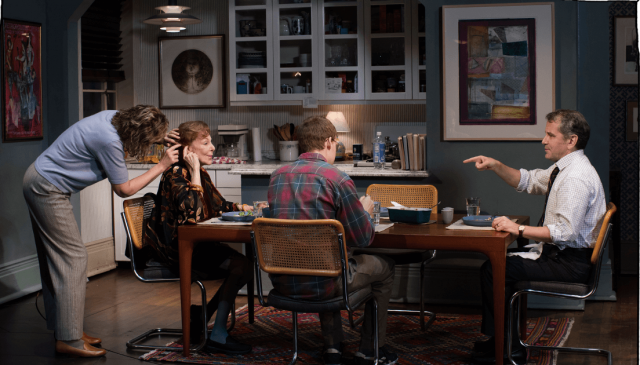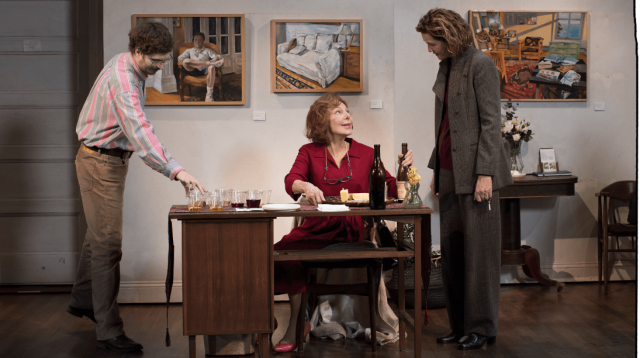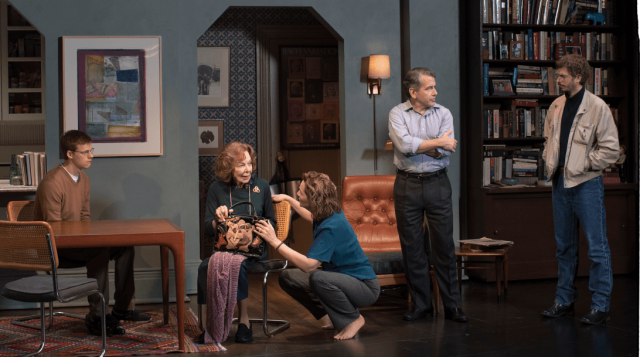
A family faces a matriarch experiencing dementia in Kenneth Lonergan’s The Waverly Gallery (photo by Brigitte Lacombe)
Golden Theatre
252 West 45th St. between Broadway & Eighth Ave.
Tuesday – Sunday through January 27, $49 – $149
thewaverlygalleryonbroadway.com
Elaine May gives a career-topping performance as an octogenarian suffering from dementia in the Broadway debut of Kenneth Lonergan’s Pulitzer Prize finalist, the sensitive, bittersweet memory play The Waverly Gallery. Running through January 27 at the Golden Theatre — the same venue where May and her longtime comedy partner, Mike Nichols, staged An Evening with Mike Nichols and Elaine May in October 1960 — The Waverly Gallery takes place between 1989 and 1991 in a small, inconsequential Greenwich Village art gallery operated by eighty-five-year-old Gladys Green (May) and the Upper West Side apartment where Green’s daughter, Ellen Fine (Joan Allen), lives with her second husband, Howard Fine (David Cromer), and their dog. Ellen’s son, Daniel Reed (Lucas Hedges), often comes over for dinner, along with Gladys. “I want to tell you what happened to my grandmother, Gladys Green, near the end of her life,” Daniel tells the audience early on in the first of a series of direct addresses looking back at the past. “I lived in her building — where I still live — in Greenwich Village, during the last couple of years when she was there. . . . For twenty-eight years she ran a tiny gallery on Waverly Place, around the corner from where we lived. And without being too depressing about it, she didn’t always have the best stuff in there. But some of it was pretty good. . . . It’s not that I didn’t like her. I did. It’s just that once you went in there, it was kind of tough getting out again. So I was pretty stingy with the visits.”

Art gallery owner Gladys (Elaine May) speaks with her daughter, Ellen (Joan Allen), as painter Don (Michael Cera) looks on in Broadway debut of Kenneth Lonergan play (photo by Brigitte Lacombe)
One day a somewhat egotistical artist from Massachusetts, Don Bowman (Michael Cera), walks into the gallery, which is connected to a hotel undergoing renovations, with his portfolio, and Gladys decides not only to give him a show but also to let him sleep in the back room, as he claims to have no money. Ellen, who becomes easily exasperated with her mother, and Howard, who practically yells at Gladys when he talks to her, thinking she is deafer than she is, are suspicious of Don’s motives as he insinuates himself into Gladys’s life. But when the hotel owner tells the family that he is taking back the gallery to turn it into a breakfast café, Ellen, Howard, and Daniel have to figure out a way to tell Gladys, whose Alzheimer’s is getting worse.
The play opens with Gladys saying, “I never knew anything was the matter.” Although she was specifically referring to Ellen’s first marriage falling apart, she could just as well be talking about her own life. Her memory lapses, hearing problems, and inability to truly understand what is going on around her are harrowing to watch, yet Lonergan, the writer-director of such award-winning films as You Can Count on Me and Manchester by the Sea and such hit plays as This Is Our Youth and Lobby Hero, injects plenty of humor into the strife. “We’re liberal Upper West Side atheistic Jewish intellectuals — and we really like German choral music,” Daniel tells Don. A dinner scene in which Ellen and Howard futz with Gladys’s hearing aid has a slapstick touch. And Gladys’s forgetfulness can be charming and funny — until it’s not. The eighty-six-year-old May, a National Medal of Arts winner who wrote, directed, and starred in A New Leaf and worked with the likes of Nichols, Warren Beatty, and Neil Simon in such films as The Birdcage, The Heartbreak Kid, and, yes, Ishtar, imbues Gladys with such honesty and sincerity that it’s heart-wrenching watching her decline.

Lucas Hedges, Elaine May, Joan Allen, David Cromer, and Michael Cera star in The Waverly Gallery (photo by Brigitte Lacombe)
In her first Broadway show, Drama Desk- and Obie-winning director Lila Neugebauer, who is building an impressive résumé with such works as Edward Albee’s At Home at the Zoo, Annie Baker’s The Antipodes, Branden Jacobs-Jenkins’s Everybody, and Sarah DeLappe’s The Wolves, superbly balances the humor and heartbreak, never letting melodrama take over and instead including numerous moments in which the audience feels appropriately uncomfortable going from laughing to tearing up as David Zinn’s sets alternate between New York City apartments to the quaint belowground art gallery. Grammy winner and Oscar nominee May, Tony winner and Emmy and Oscar nominee Allen (Burn This, The Contender), Tony-winning actor and director Cromer (The Band’s Visit, Tribes), Oscar nominee Hedges (Manchester by the Sea, Yen), and Tony nominee Cera (Arrested Development, Juno), in his third consecutive Lonergan play on Broadway, form a stellar ensemble, capturing the essence of an extended family facing a tragic situation. (The 1999 original cast featured a widely hailed Eileen Heckart as Gladys, Maureen Anderman as Ellen, Mark Blum as Howard, Josh Hamilton as Daniel, and Anthony Arkin as Don; Anderman is now May’s understudy on Broadway.) “Honey? Do you think the Village has changed much in the last five years?” Gladys asks Daniel, who responds, “Yes! It’s been changing for a lot longer than that!” But what hasn’t changed nearly enough is the brutal impact of Alzheimer’s disease on sufferers and their families, so aptly on display in this perceptive and humane production.